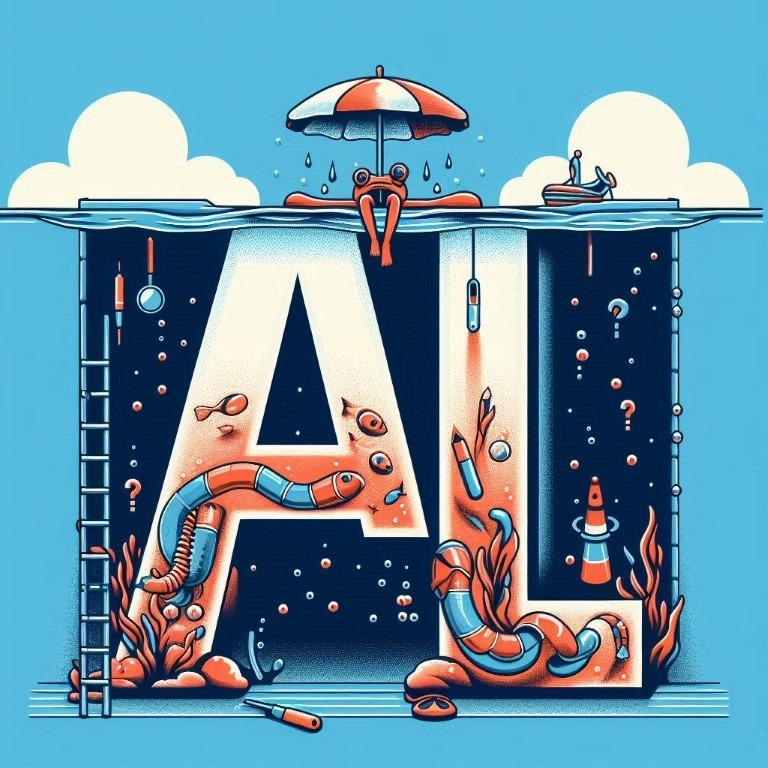Artificial Intelligence (AI) is ubiquitous. It's a hot topic in news, tech events, and product launches. However, with all the hype, it takes time to discern genuine advancements from marketing hype. Are the grand promises about AI living up to expectations, or are we just caught up in the excitement?
Are the grand promises about AI living up to expectations, or are we just caught up in the excitement?
Let's separate fact from fiction. AI is already profoundly impacting various industries. From healthcare to finance, AI is more than just a passing tech trend—it's reshaping business operations and our daily lives. Teams harness AI in powerful ways, demonstrating its potential beyond mere claims.
So, what's the real story with AI, and where is it genuinely making a difference? Let's delve into real-world applications that demonstrate AI's tangible impact—and consider areas where the hype may still be ahead of reality.
Are you prepared to take the plunge?

AI has become a focal point in many discussions across media, conferences, and tech industries. It's easy to get caught up in the excitement, but as you've noted, it's crucial to differentiate between actual breakthroughs and marketing hype. Let's analyse AI applications that revolutionise industries versus areas where hype may exceed reality.
it's crucial to differentiate between actual breakthroughs and marketing hype
Healthcare
AI is revolutionising healthcare in significant ways. For instance, highly accurate AI-powered diagnostic tools have been developed to analyse medical images such as X-rays and MRIs. AI-driven algorithms aid in the early detection of diseases like cancer or heart conditions, often more quickly and accurately than humans. Moreover, personalised medicine is advancing with AI predicting treatment outcomes based on genetic information, which helps customise treatments for individual patients. This represents a primary real-world application of AI that is already saving lives.
AI is playing a significant role in advancing healthcare. Here are some detailed examples:
AI-Powered Diagnostic Tools
AI algorithms analyse medical images such as X-rays, MRIs, and CT scans. With high accuracy, these tools can detect anomalies and diagnose conditions like cancer, heart disease, and neurological disorders. For example, AI systems can identify lung nodules in CT scans, which are early indicators of lung cancer.
Early Disease Detection
AI-driven algorithms can detect diseases at an early stage, often more quickly and accurately than human doctors. For instance, AI can analyse retinal images to detect diabetic retinopathy, a leading cause of blindness, before symptoms appear.
Personalised Medicine
AI is revolutionising customised medicine by predicting treatment outcomes based on a patient's genetic information. This allows for customised treatment plans tailored to the individual's genetic makeup, improving the effectiveness of treatments and reducing side effects.
Drug Development
AI is accelerating the drug discovery process by predicting how different compounds will interact with targets in the body. This can significantly reduce the time and cost of bringing new drugs to market.
Predictive Analytics
AI is used to predict patient outcomes and disease progression. For instance, predictive models can forecast which patients are at risk of developing complications, allowing for early intervention and better management of chronic diseases.
Telemedicine and Remote Monitoring
AI-driven telemedicine platforms enable remote consultations and continuous patient monitoring, which is particularly beneficial for managing chronic conditions and providing care in remote or underserved areas.
These examples highlight how AI is a futuristic concept and a present-day reality, transforming healthcare and saving lives.
The Hype vs. Reality
Despite its successes, AI's potential is often over-hyped in specific areas:

While AI can excel in specific tasks—such as playing chess or processing language—achieving accurate general intelligence requires a depth of understanding and adaptability that current AI models lack.
General AI
The concept of a fully autonomous general AI, comparable to human intelligence, is still far from reality. While AI can excel in specific tasks—such as playing chess or processing language—achieving accurate general intelligence requires a depth of understanding and adaptability that current AI models lack. Marketing around general AI often fuels fears of machines surpassing human abilities, but in reality, we're still in the era of narrow, task-specific AI.
AI in Everyday Consumer Tech

Many gadgets advertise AI features, from smart cameras to virtual assistants. However, these applications often overpromise and underdeliver, especially when understanding context or adapting to more complex human needs. The marketing may push these features as revolutionary, but many still need to rely on more than simple algorithms rather than true AI breakthroughs.
Autonomous Vehicles
Self-driving cars have been a significant focus of AI development, with enormous hype surrounding them. While companies like Tesla and Waymo have made strides, fully autonomous vehicles that can handle all driving conditions safely and reliably are still in development. The grandiose promises of autonomous vehicles taking over our roads haven't materialised yet, highlighting the gap between the hype and the current state of the technology.
Finance
AI has proven particularly useful in fraud detection and risk management. Machine learning models can detect patterns and anomalies in transaction data, identifying potential fraud in real-time. AI also powers robo-advisors, reshaping investment management by providing users with tailored advice based on complex data analysis. AI's application in finance shows that it's much more than just a buzzword—it's improving efficiency and security in susceptible domains.
Manufacturing and Supply Chain
AI-driven automation is revolutionising manufacturing processes. Powered by AI, predictive maintenance helps companies monitor equipment and forecast when a machine might fail, significantly reducing downtime. AI also enhances supply chain efficiency by analysing vast amounts of data to optimise logistics, inventory management, and route planning. This is an area where AI is streamlining operations and cutting costs.
Customer Service
AI chatbots and virtual assistants have become ubiquitous in customer service. While they are not perfect, they handle many customer queries, offering 24/7 support and reducing the workload on human agents. This technology is helping businesses scale their operations while providing timely responses to customers, making it a practical application of AI with precise results.
Grasping AI, deep learning, and machine learning isn't just important—it's essential. In just two years, falling behind on these technologies could make you feel like a relic of the past, outpaced by innovation and left in the dust of the digital age.
I recently conducted a survey featuring four options to gauge the general sentiment regarding the relevance of comprehending AI, deep learning, and machine learning in today's dynamic technological environment.
The options presented were as follows:
- Essential: Stay ahead to succeed or risk falling behind.
- Important: tasks are not urgent but still require attention.
- They are helpful but only a game-changer for some.
- They are over-hyped and may not be necessary for everyone.
After collecting survey responses, I meticulously analysed the data, providing a comprehensive breakdown for each option. Furthermore, I expounded upon the significance of each choice and presented counterarguments to ensure a well-rounded understanding of the subject matter.

Option 1
Essential: Stay ahead to succeed or risk falling behind.
Why Some People Believe It Is “Essential”: Stay Ahead to Succeed or Risk Falling Behind
Rapid Technological Advancements
AI, machine learning, and deep learning are evolving quickly. Companies that adopt these technologies early can leverage them to automate processes, gain deeper insights, and create more efficient systems. Falling behind on these advancements may make it harder to catch up later, putting businesses at a competitive disadvantage.
Industry Disruption
AI is already disrupting various industries, including healthcare, finance, manufacturing, and retail. Businesses that integrate AI can innovate faster, improve customer experiences, and reduce costs. Companies that fail to adapt risk losing market share to AI-driven competitors that can offer more value through automation, predictive analytics, and personalisation.
Automation and Efficiency Gains
AI allows businesses to automate routine tasks, analyse large data sets quickly, and enhance decision-making processes. Companies can focus more on strategy, creativity, and innovation by automating manual tasks and workflows. Without adopting AI, organisations could be bogged down by inefficiencies that competitors have already solved.
Data-Driven Decision-Making
AI and machine learning enable organisations to extract valuable insights from vast amounts of data, leading to better decision-making. In the modern world, businesses generate more data than ever, and AI helps them make sense of it. Falling behind on AI technologies means missing out on these data-driven opportunities, which could limit growth and innovation.
Customer Expectations
Customers expect personalised and seamless experiences in an increasingly digital world. AI helps companies meet these expectations by powering recommendation systems, chatbots, and tailored marketing strategies. Businesses that don't embrace AI could need help keeping up with evolving customer demands, losing customer loyalty and revenue.
Global Competition
The global race for AI dominance is indisputable. Countries and companies are heavily investing in AI research and development. Falling behind on AI isn't just a local issue—it's global. If businesses or nations don't keep pace, they may be out-competed by those who do, losing out on economic opportunities and technological leadership.
The idea that "it is essential to stay ahead to succeed or risk falling behind" reflects the widespread perception that artificial intelligence (AI), machine learning, and deep learning are spearheading the next industrial revolution. Innovation will surpass businesses and individuals who are unable to adapt, but those who take advantage of these innovations will be in a better position to lead and prosper. It takes more than development to stay ahead when things change so quickly.
Option 2
Important: tasks are not urgent but still require attention.
Let's discuss the logical reasons why some people think this.
Alternative View
While AI is undoubtedly crucial for future success, the idea that it demands immediate and urgent action may be overemphasised in specific contexts. Let's explore the logical reasons why some people believe that while AI adoption is essential, it's not necessarily urgent but does need consistent attention.
Incremental Adoption
Many industries and businesses can adopt AI gradually. Implementing AI is not a "one-size-fits-all" solution and doesn't always have to be rushed. Companies can start small, integrating AI into specific processes over time without an immediate overhaul of their operations. For them, AI is important, but there's room to implement it thoughtfully.
Immediate ROI Isn't Always Clear
While AI has transformative potential, the return on investment (ROI) isn't always immediate. For some organisations, investing in AI may yield little benefits, and it might take time to gather enough data or fine-tune models. This reduces the sense of urgency, allowing organisations to approach AI adoption at a more measured pace.
Existing Systems Work for Now
Many organisations already have established processes that function well without AI. While AI could improve these processes, it's not always critical for survival in the short term. Organisations in sectors like manufacturing, education, or retail might see AI as an enhancement rather than a game-changer so they can focus on other priorities while keeping AI on their radar.
Regulatory and Ethical Considerations
There are still significant ethical and regulatory challenges associated with AI, particularly regarding data privacy, bias, and accountability. Businesses need time to address these concerns and create the necessary infrastructure for responsible AI use. In this context, AI is important, but the urgency is tempered by the need for careful implementation to avoid unintended consequences.
Limited Immediate Disruption in Certain Fields
In industries that rely heavily on human judgement, creativity, or physical labour (e.g., construction, counselling, or the arts), the immediate impact of AI is less dramatic. While AI might eventually play a more significant role, the urgency to adopt it quickly is lower compared to tech-centric fields. These industries still recognise AI's importance but may focus on human-driven priorities in the short term.
Resources and Expertise Gaps
Adopting AI requires significant skills, infrastructure, and resource investment. Some businesses, especially smaller ones, may not yet have the capacity to fully engage with AI technologies, making it an essential but non-urgent task. They might prioritise developing internal capabilities over rushing to adopt AI solutions prematurely.
While machine learning, deep learning, and artificial intelligence are unquestionably significant and will influence many industries in the future, they may not be necessary for all companies or industries. Companies and people can afford to take a deliberate approach to adopting AI, ensuring they concentrate on doing it correctly rather than jumping in headfirst. The secret is recognising that AI needs constant care to stay competitive in the rapidly changing digital market, even while it's not urgent.
Option 3
They are helpful but only a game-changer for some.
Alternative View
However, there is a more moderate stance where some believe AI is helpful but only a game-changer for specific sectors. While AI is undeniably powerful, its transformative effects may not be as universal as often claimed. Let's explore some logical reasons behind this belief:
Not All Industries Benefit Equally
AI excels in data-heavy, pattern-based industries like finance, healthcare, and logistics, where automation and predictive analytics offer significant advantages. However, AI may enhance some processes in industries requiring complex human interaction, physical dexterity, or creativity (e.g., social work, construction, art) but isn't fundamentally reshaping the industry. These sectors rely heavily on human intuition, empathy, and problem-solving skills.
High Implementation Barriers
For many small businesses and organisations, adopting AI requires significant financial and technical resources. AI solutions often require specialised hardware, substantial data preparation, and constant upkeep. AI's benefits might be limited for companies without large datasets or technical expertise, making it more of a helpful tool rather than a transformative force.
The Human Element in Decision-Making
While AI can assist in decision-making through data analysis, it cannot often account for nuanced, context-specific judgements. Professions like law, management, or education still require ethical considerations, empathy, and a deep understanding of context, which AI cannot fully replicate. AI is a support tool in these fields, not a replacement for human decision-makers.
Bias and Limitations
AI systems are only as good as the data they're trained on. When AI models are built on biased or incomplete data, their outputs can perpetuate those biases. For specific industries, such as hiring, healthcare, or criminal justice, the risk of AI-driven bias makes it less of a game-changer and more of a helpful assistant, with human oversight still essential.
Public Scepticism and Ethical Concerns
In fields like healthcare or education, where trust and human connection are paramount, AI adoption might face resistance. People may feel uncomfortable with AI making decisions on their health, education, or other personal matters, limiting its impact and acceptance in these areas.
While machine learning, deep learning, and artificial intelligence (AI) are unquestionably beneficial and revolutionary in specific domains, they aren't always revolutionary in others. Artificial intelligence's contribution will probably stay supplemental rather than revolutionary for many businesses and professions, offering valuable assistance without radically changing the terrain.
Option 4
They are over-hyped and may not be necessary for everyone.
Logical reasons behind why they think it is over-hyped.
Counterargument
There is a growing belief that AI and its related technologies are over-hyped and may not be necessary for everyone. While the hype surrounding AI suggests that it will revolutionise every industry, some argue that its current applications are limited. AI integration is seen as more of a luxury than a necessity for many professions.
Logical Reasons Why Some May Think AI is Over-hyped
Overestimation of AI Capabilities
While artificial intelligence (AI) is sometimes presented as a panacea that can fix every issue, many AI systems still struggle with jobs that call for flexibility, common sense, and contextual knowledge. AI, for instance, excels at certain activities, such as pattern recognition or picture identification, but finds it difficult to do tasks that call for empathy, moral judgement, or creativity. This discrepancy between expectations and present capabilities fuels scepticism.
Limited Impact on Certain Professions
AI's benefits are evident in sectors such as banking, healthcare, and logistics, but not all businesses will be under the same pressure to adopt AI. For vocations that require physical dexterity, interpersonal skills, or creative insight—such as plumbers, artists, and teachers—the immediate need for AI may be modest, making the technology extra.
High Implementation Costs
For many small businesses and organisations, the cost of adopting AI solutions may outweigh the benefits. AI systems often require specialised hardware, significant data preparation, and constant fine-tuning. AI may seem an over-hyped trend for these businesses rather than a viable, cost-effective tool.
Human Preference for Human Interaction
In healthcare and education, individuals often express a preference for human interaction, particularly in contexts necessitating trust, compassion, and nuanced decision-making. While it is plausible that AI systems may eventually supplant human labour within these domains, it is imperative to discern that the potential impact of AI may be overstated.
These factors strongly support the perspective that AI, while transformative for specific sectors, may not be as universally applicable or pressing as the hype suggests.

Embracing the Future: Humans Vs Machines
As AI technology advances, various groups, activists, or movements will likely form in response to these developments.
Several vital concerns could drive such movements:
Job Displacement
Many fear that rapid AI integration will result in widespread automation and job loss, particularly in industries where automation threatens jobs. This could lead to opposition from groups advocating for workers' rights.
Ethical Concerns
AI's involvement in sensitive areas such as surveillance, data privacy, and decision-making (e.g., criminal justice, hiring) could lead to movements calling for stronger regulations. Civil liberties and ethical AI use groups may challenge its unchecked deployment.
AI Bias and Fairness
AI systems' biases could spark opposition from activists concerned with social justice, as biased AI can disproportionately harm marginalised communities. Movements advocating for fairness and transparency in AI systems are already growing.
Environmental Concerns
AI, particularly in its deep learning forms, requires massive computational power, which consumes energy. Environmental activists could raise concerns about AI technologies' carbon footprint, calling for more sustainable practices.
Human Autonomy and Control
Philosophical and existential debates about AI's role in human decision-making and the potential erosion of human autonomy could also give rise to movements that resist AI integration into everyday life. Concerns about AI surpassing human control, leading to unforeseen consequences, are frequently cited in such discussions.
Acknowledgements
Dr Nicolai Baldin, a machine-learning researcher at the University of Cambridge, founded Synthesised in 2017 to develop an AI-powered platform that combines data provisioning and preparation in one comprehensive package. https://www.synthesized.io
Onfido's goal is to help companies verify individuals' identities. Established in 2012, the company aids businesses in preventing fraud by utilising machine learning and artificial intelligence (AI) technologies, such as facial detection and character recognition, to authenticate documents like ID cards and passports.
Plum is a financial advisor with artificial intelligence (AI) who helps users save more money.
Thanks to poly AI, contact centres can grow. Through voice, email, or message, the company's technology comprehends consumer enquiries and conversationally responds to them.
Alfred Health utilises artificial intelligence in radiography.
10 real-world examples of AI in healthcare
AI in Action: Top 7 Real-Life Examples of AI Revolutionizing the Healthcare Industry

